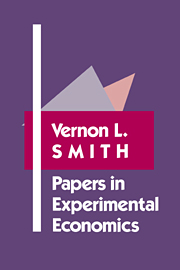Book contents
- Frontmatter
- Contents
- Preface
- Acknowledgments
- Part I The Formative Years
- Part II Institutions and Market Performance
- Introduction
- 10 On Nonbinding Price Controls in a Competitive Market
- 11 An Experimental Comparison of Alternative Rules for Competitive Market Exchange
- 12 Competitive Market Institutions: Double Auctions vs. Sealed Bid-Offer Auctions
- 13 Markets as Economizers of Information: Experimental Examination of the “Hayek Hypothesis”
- 14 The Effect of Rent Asymmetries in Experimental Auction Markets
- 15 Microeconomic Systems as an Experimental Science
- 16 Experimental Economics (Reply to R. Heiner)
- 17 A Comparison of Posted-Offer and Double-Auction Pricing Institutions
- 18 Hypothetical Valuations and Preference Reversals in the Context of Asset Trading
- 19 Bubbles, Crashes, and Endogenous Expectations in Experimental Spot Asset Markets
- Part III Public Goods
- Part IV Auctions and Institutional Design
- PART V Industrial Organization
- Part VI Perspectives on Economics
Introduction
Published online by Cambridge University Press: 06 July 2010
- Frontmatter
- Contents
- Preface
- Acknowledgments
- Part I The Formative Years
- Part II Institutions and Market Performance
- Introduction
- 10 On Nonbinding Price Controls in a Competitive Market
- 11 An Experimental Comparison of Alternative Rules for Competitive Market Exchange
- 12 Competitive Market Institutions: Double Auctions vs. Sealed Bid-Offer Auctions
- 13 Markets as Economizers of Information: Experimental Examination of the “Hayek Hypothesis”
- 14 The Effect of Rent Asymmetries in Experimental Auction Markets
- 15 Microeconomic Systems as an Experimental Science
- 16 Experimental Economics (Reply to R. Heiner)
- 17 A Comparison of Posted-Offer and Double-Auction Pricing Institutions
- 18 Hypothetical Valuations and Preference Reversals in the Context of Asset Trading
- 19 Bubbles, Crashes, and Endogenous Expectations in Experimental Spot Asset Markets
- Part III Public Goods
- Part IV Auctions and Institutional Design
- PART V Industrial Organization
- Part VI Perspectives on Economics
Summary
Soon after I came to the University of Arizona in 1975,1 became involved in joint work with several undergraduate and graduate students in the development of interactive software programs that would enable experimental subjects to trade via computer terminals under the rules of alternative exchange institutions. The computer brought a new dimension to experimental economics. This period also initiated my longtime collaboration with Arlington W. Williams, first as a graduate student at the University of Arizona, then as a member of the faculty at Indiana University. Williams has been instrumental in bringing the “machine age” to economic experimentation in the form of a staggering volume of software development and refinement.
With these new tools we undertook a number of studies of comparative institutional performance. We systematically examined the effect of nonbinding price controls under computerized double auction trading rules (paper 10). This work had been motivated by the original discovery by R. Mark Isaac and Charles Plott of the nonbenign dynamic effect of price controls, including nonbinding controls, on convergence to competitive equilibria — a result that was not anticipated by static theory. Williams and I executed a design based on a systematic replication of these unexpected results and measured the quantitative effect of nonbinding controls on price outcomes within this design.
- Type
- Chapter
- Information
- Papers in Experimental Economics , pp. 161 - 163Publisher: Cambridge University PressPrint publication year: 1991



